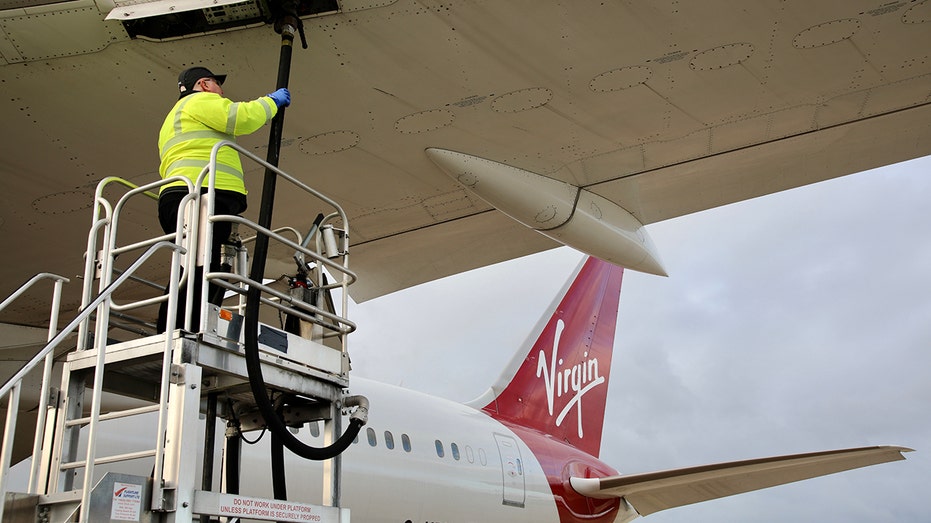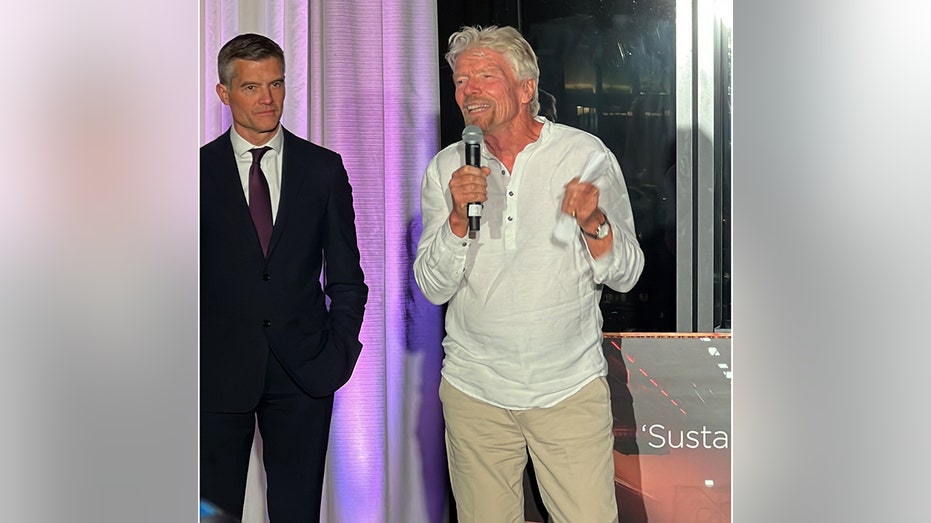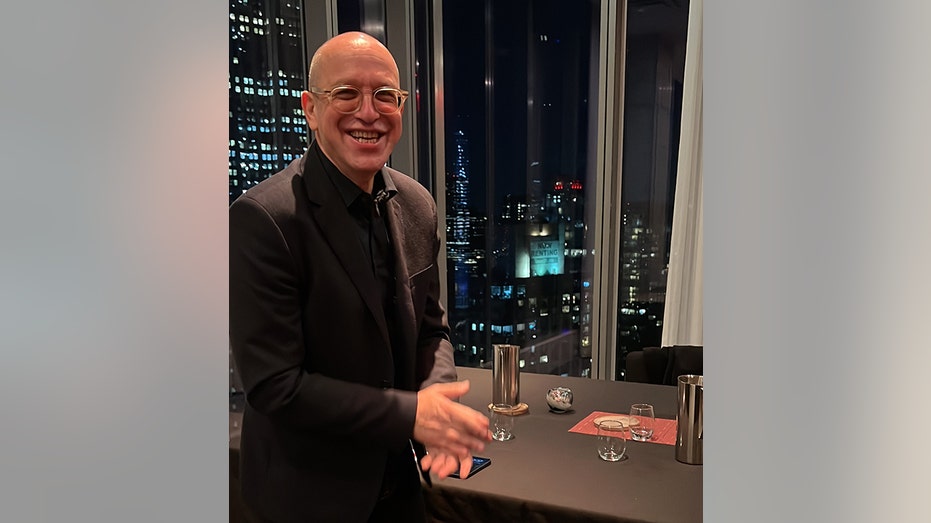Richard Branson on Virgin Atlantic's sustainable fuel flight: 'It can be done'
Sustainable aviation fuel accounts for less than 0.1% of total jet fuel volumes
Virgin Group founder Richard Branson celebrates historic transatlantic flight on 100% sustainable fuel
Virgin Group founder Richard Branson announces Tuesday evening that Virgin Atlantic made history with the first transatlantic flight on 100% sustainable aviation fuel.
Inside a crowded room at Virgin Group's Virgin Hotels in New York City Tuesday evening, Richard Branson triumphantly announced: "It can be done."
Hours earlier, Virgin Atlantic became the first commercial airline in the world to complete a transatlantic flight on 100% sustainable aviation fuel (SAF) when Flight100 touched down at New York's John F. Kennedy International Airport.
"Today was truly historic," Branson said to a room full of media and industry leaders, which included some naysayers. "After today, everybody now knows it can be done."
UNITED AIRLINES CREATES FUND FOR SUSTAINABLE AVIATION FUEL
Flight100, a Boeing 787 aircraft using Rolls-Royce Trent 1000 engines, took off from London's Heathrow airport around 11:30 a.m. local time Tuesday to prove that SAF fuel is a safe replacement for fossil-derived jet fuel for long-haul flights. It marked a significant milestone in the industry's journey to achieve net-zero by 2050.
It was a non-commercial flight, which means there were no paying customers aboard. However, Branson was accompanied by dozens of other individuals, including his daughter, Holly, CEO Shai Weiss, members of the media and government officials.
"We've shown that it can be done safely and that's at 100%," Weiss told FOX Business in an interview Tuesday, adding that there is still a long road ahead.

Virgin Atlantic's Flight100 takes off from London to New York on Nov. 28, 2023. (Virgin Atlantic)
The journey to this point consisted of radical collaboration between several industries for over a year. The airline also had to seek permission from several regulators in order to execute the test flight.
Sustainable aviation fuel is already used to power jet engines but current fuel standards only allow for a 50% blend of sustainable aviation fuel with traditional jet fuel in commercial jet engines.
To date, sustainable aviation fuel, produced using a range of sustainable feedstocks like cooking oil, is seen as the only viable solution to decarbonize flying until other technologies such as new electric and hydrogen-powered options come into play. Those options are decades away, Virgin said.
WORLD'S FIRST FULLY ELECTRIC FLYING CAR APPROVED BY FAA; COMPANY NOW ACCEPTING PREORDERS

Richard Branson speaks after Virgin Atlantic made history as the first commercial carrier to complete the first transatlantic flight on 100% SAF. (Leandra Creative Co. Photography/Fox Business / Fox News)
A flight powered by 100% SAF delivers a CO2 lifecycle emissions savings of up to 70%, according to Virgin, which is trying to achieve significant reductions in CO2 emissions in 2026, 2030 and 2040.
The issue is that SAF is still hard to come by, representing less than 0.1% of global jet fuel volumes.
"So the scale required by 2030, not for Virgin Atlantic, for the world is 100 to 150 times of what we have today," Weiss said.
He has repeatedly warned that there is far more work to be done by industries and policymakers, saying that this is far bigger than just Virgin Atlantic.
"There is simply not enough SAF and it's clear that in order to reach production at scale, we need to see significantly more investment," Weiss said in a statement ahead of the flight. "This will only happen when regulatory certainty and price support mechanisms, backed by government, are in place."
To reach industry targets, it requires "a radical collaboration of everyone, governments, oil majors, aviation entrepreneurs, technology companies, manufacturers to come together and create the environment and the conditions for this to make manufacturing that scale," Weiss said.
For next year, the company has already bought 6,000 tons of SAF, although Weiss told FOX Business that they would buy more if it was available.
During an interview Tuesday, Weiss said that during the early part of an adoption curve, the price is higher. And while the higher price will translate to higher fares in the early days, Weiss believes the price will be worth the "significantly" reduced emissions.
GET FOX BUSINESS ON THE GO BY CLICKING HERE
"The fuel that we would be buying, it would be more expensive. Airlines need to share the cost of fuel with consumers, with businesses as long as they use our services," Weiss explained. "So there will be an increase potentially in the price of tickets, but that is probably a price worth paying if what we're getting out of it is significantly reduced emissions."

CEO Shai Weiss chats with FOX Business after Virgin Atlantic made history as the first commercial carrier to complete a transatlantic flight on 100% SAF. (Leandra Creative Co. Photography / Fox Business / Fox News)
In the long term, though, Weiss said this fuel will eventually be cheaper than its alternatives.
"The difference between renewable energy and fossil fuel jet fuel is the fossil fuel is finite. Now it will take tens of years for it to run out, but at some point it's going to run out. And renewable energy is infinite," Weiss said. "In the long run, and I'm talking about the long term and all the way to 2050, this should be as cheap, if not cheaper, than the alternatives."





















